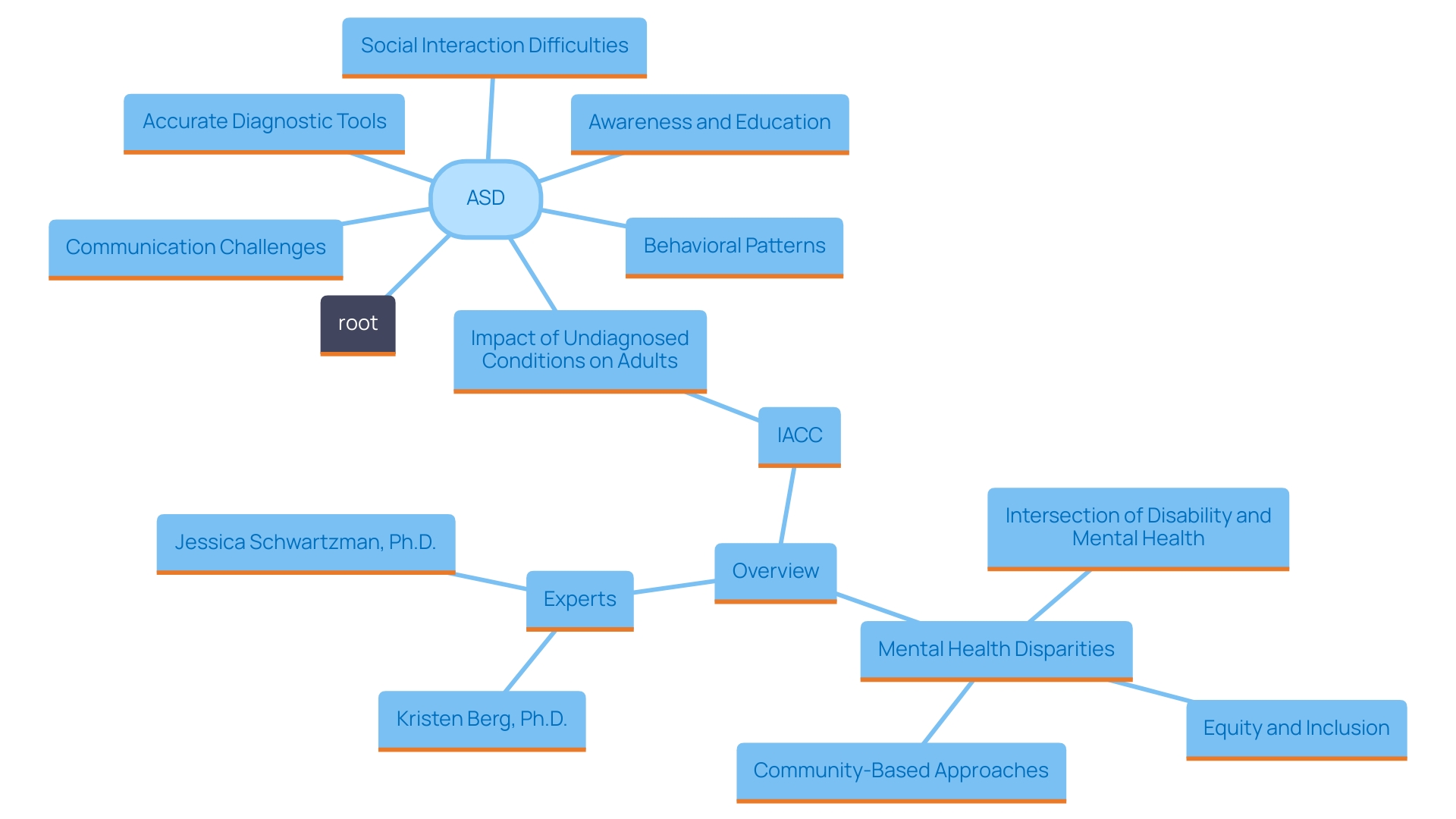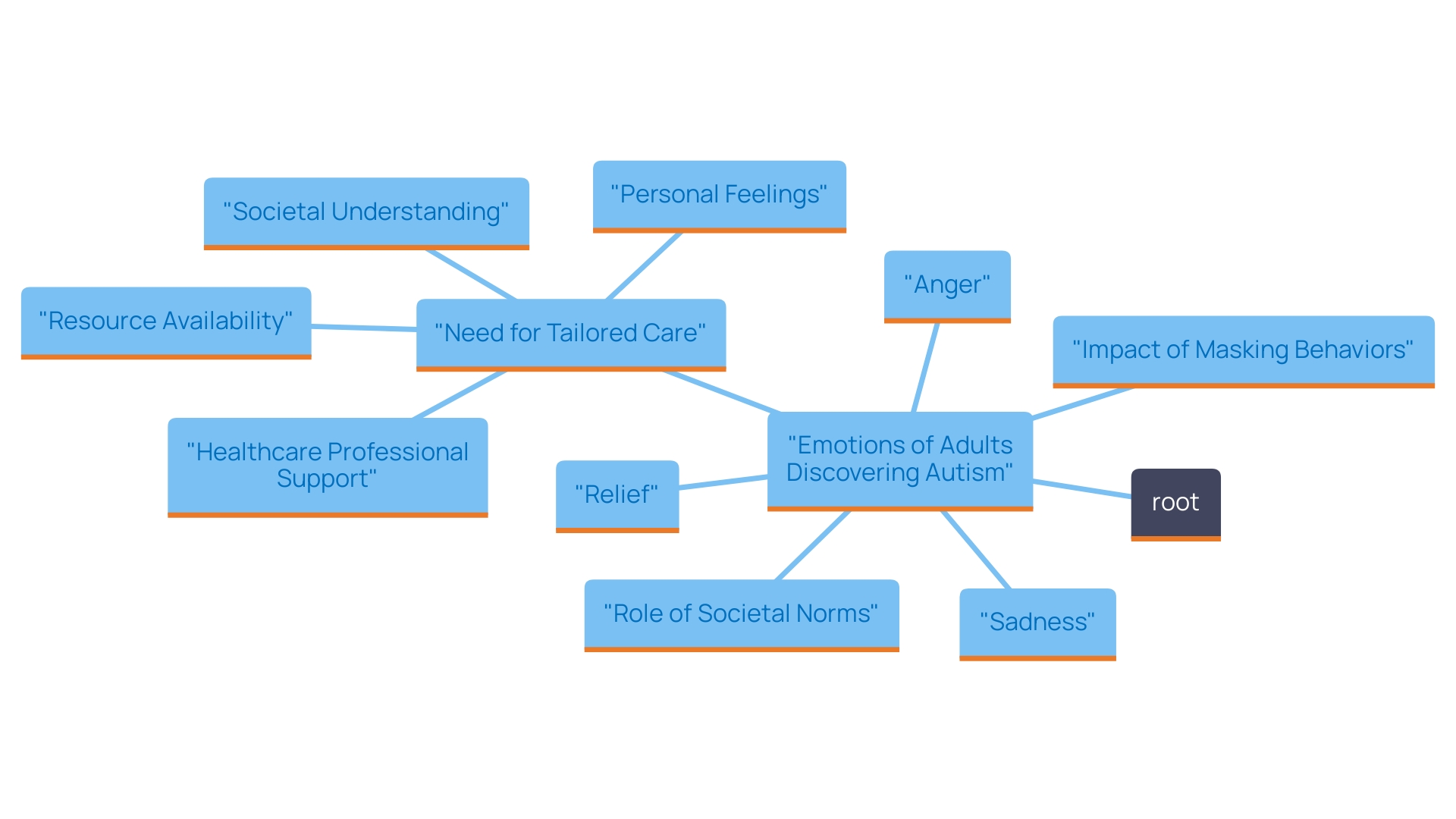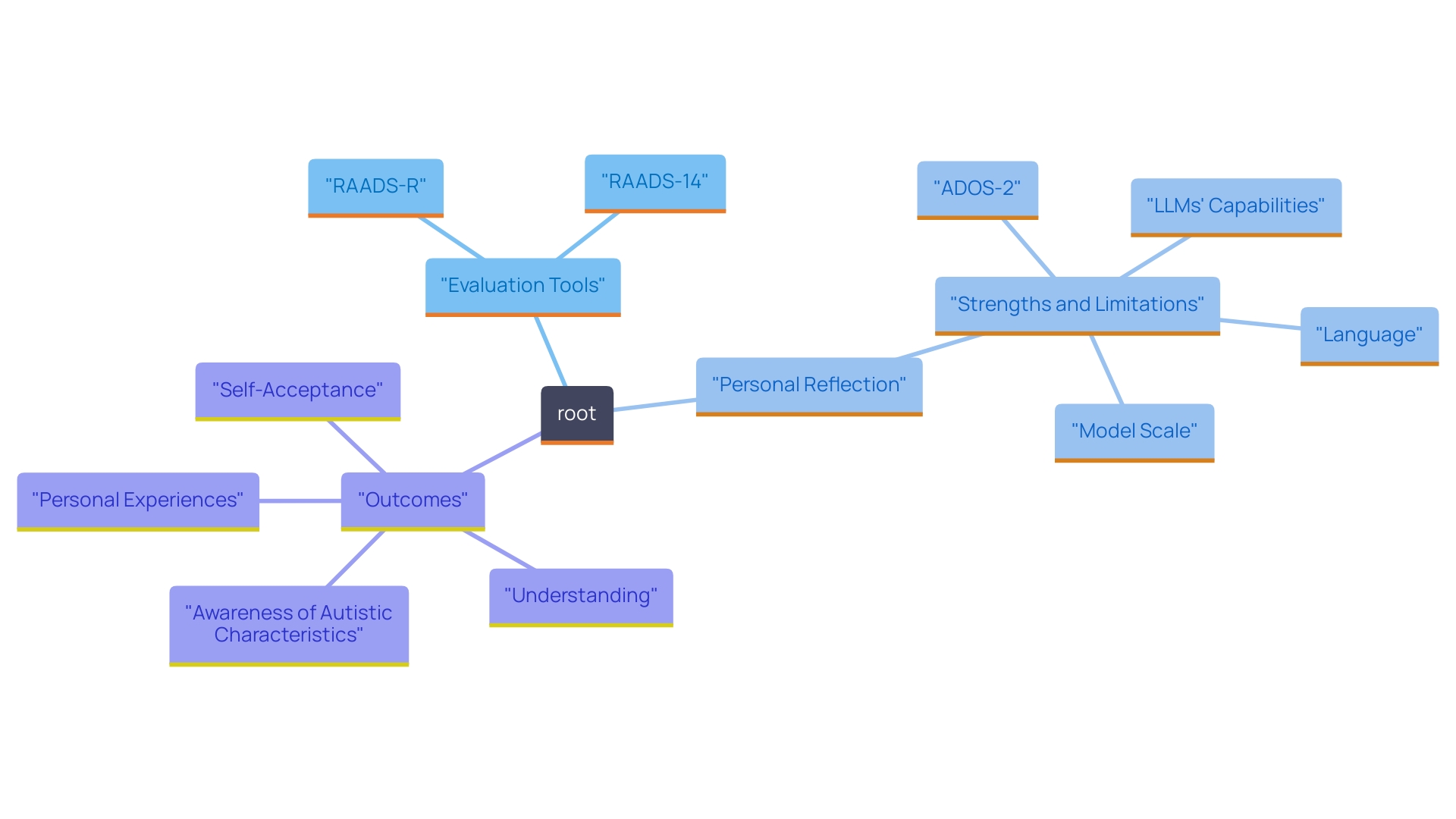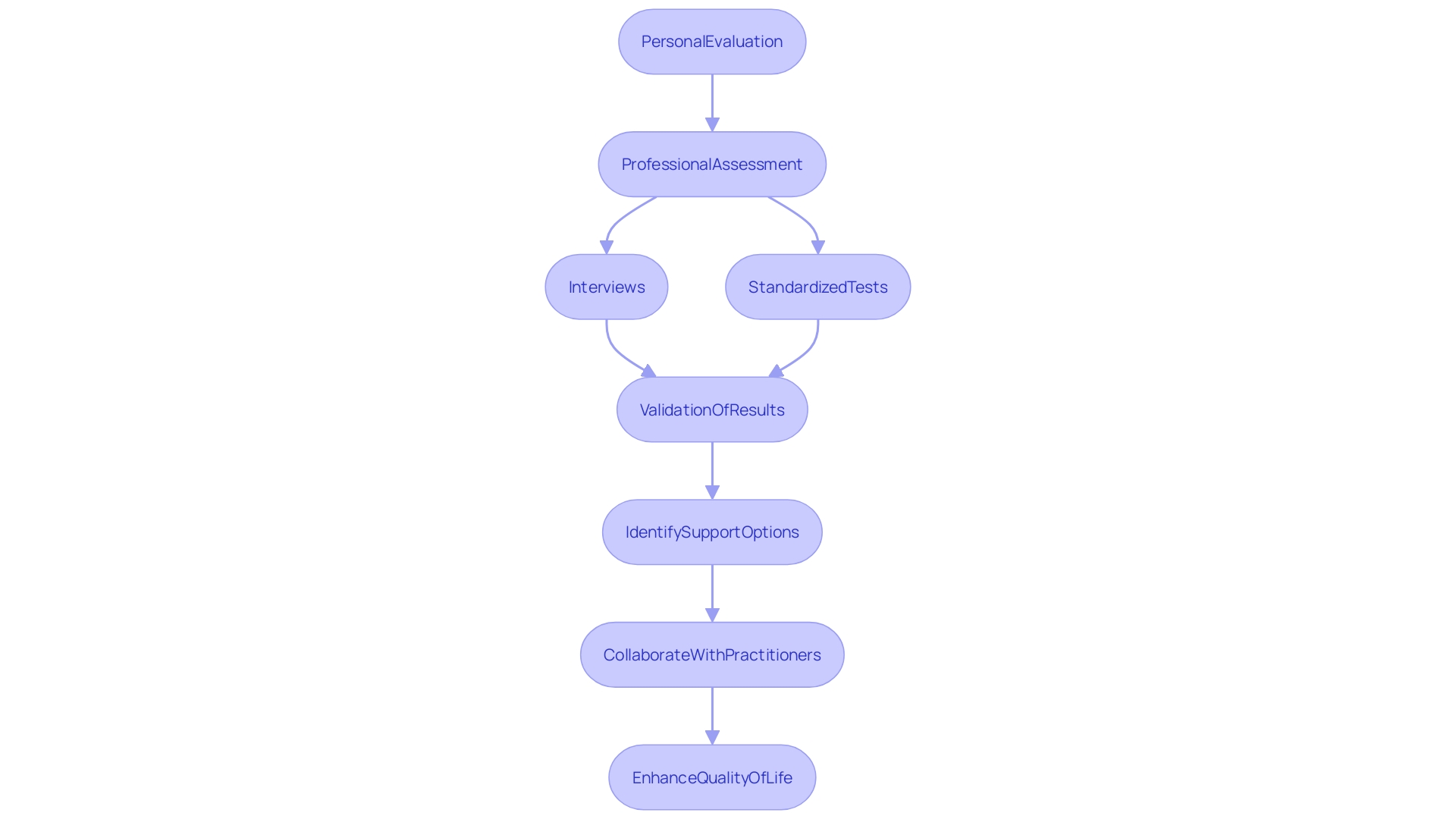Introduction
Understanding Autism Spectrum Disorder (ASD) in adults is a crucial yet often overlooked aspect of mental health that can significantly impact individuals and their families. With approximately 1 in 45 adults diagnosed with ASD in the U.S., many remain undiagnosed or misdiagnosed, leading to a lifetime of challenges that go unrecognized. The complexities of ASD manifest uniquely in adulthood, affecting social interactions, communication, and behavior.
As the conversation around autism evolves, so too does the importance of awareness and education regarding its signs and symptoms. This article delves into the emotional journey of discovering autism later in life, practical self-assessment techniques, and the value of professional evaluations, empowering individuals to navigate their experiences with confidence and clarity.
Understanding Autism Spectrum Disorder in Adults
Autism Spectrum Disorder (ASD) in individuals can manifest in numerous ways, making a thorough understanding of its traits crucial for effective identification and assistance. Approximately 1 in 45 adults in the U.S. are diagnosed with ASD, yet many may remain undiagnosed or misdiagnosed, leading to a lifetime of unrecognized challenges. This emphasizes the significance of awareness and education about the common signs of the condition, especially for individuals who suspect they might be on the spectrum.
Adults with ASD often face hurdles in social interactions, communication, and behavior, which can manifest as difficulties in understanding social cues, engaging in conversation, or adapting to changes in routine. These traits are not just limited to children; the hallmark challenges of social communication skills and restricted and repetitive behaviors carry into adulthood. Recognizing these characteristics enables individuals to reflect on their experiences and feelings, paving the way for self-assessment and the pursuit of appropriate assessments.
Recent studies indicate that the precision of screening instruments for developmental disorders, such as the RAADS-R and RAADS-14, is essential for individuals seeking a trustworthy diagnosis. This is especially significant in a time when public health outreach has raised awareness and screening for developmental disorders, yet many adults still struggle with the implications of their undiagnosed conditions. The DSM-5 outlines the diagnostic criteria for the condition, emphasizing that core features must be present from early childhood. However, for some individuals, symptoms may only become apparent when social demands exceed their coping capacities, often masked by learned coping strategies developed over the years.
For anyone suspecting they may have ASD or recognizing similar traits in someone close to them, the journey towards understanding this condition begins with awareness of these signs. It is crucial not only for self-discovery but also for accessing resources, support systems, and potentially life-changing interventions that can significantly enhance quality of life.

The Emotional Journey of Discovering Autism in Adulthood
The journey of discovering autism in adulthood can be a deeply emotional and transformative experience. Many adults may find themselves reflecting on a lifetime of undiagnosed symptoms, leading to a mix of frustration, confusion, and, at times, relief. Recognizing and validating this emotional landscape is crucial for effective personal evaluation. It’s important for individuals to give themselves permission to process a range of feelings—from relief at finally understanding themselves, to anger for the years of misunderstanding, or sadness for the challenges they faced without the right support. This emotional readiness is essential, as it fosters an open mindset that is beneficial when approaching self-assessment tools designed to clarify the nuances of spectrum disorders.
For instance, many individuals may resonate with the notion that they have spent years masking their true selves—adapting their behavior to fit societal norms—and this can lead to significant emotional distress. Research indicates that the act of masking, which often feels like a necessity in social situations, can contribute to heightened levels of anxiety and depression. As more individuals step up to share their experiences, it becomes clear that the acknowledgment of this condition can act as a crucial moment in their lives. The knowledge that they are not alone in their experiences can empower them to seek the support they need and to engage with resources that were previously inaccessible.
Furthermore, the healthcare sector is starting to acknowledge the significance of comprehending the condition in grown individuals, especially among professionals such as paramedics and first responders who might meet patients with ASD. Tailoring their approach to meet the specific needs of autistic individuals can lead to more effective and compassionate care. By adopting an open-minded viewpoint, healthcare providers can guarantee that all patients, including those with developmental differences, receive the patient-centered care they deserve. This developing awareness not only assists in personal evaluation for individuals but also fosters a wider comprehension of autism in society, motivating others to investigate and affirm their own experiences.

Practical Self-Assessment Techniques for Adults on the Spectrum
Participating in reflective practices can be a powerful catalyst for individuals seeking to understand their unique experiences with Autism Spectrum Disorder (ASD). Start by examining trustworthy evaluation tools specifically created for grown-ups, such as the RAADS-R and RAADS-14 questionnaires. These tools have been analyzed for their precision in recognizing autistic characteristics among adults, with one research project investigating a sample of 839 individuals, including those diagnosed with the condition and those who believed they might be on the spectrum. As you delve into these assessments, take time to reflect on your responses and consider how they resonate with your daily experiences. This reflective practice not only enhances awareness of your behaviors but also helps you recognize how they align with recognized ASD characteristics. For many, this journey of self-discovery is crucial for fostering self-acceptance and understanding. Remember, the process of personal evaluation is not just about obtaining a label; it is about gaining insights into your personal narrative and how ASD may have shaped your interactions and experiences throughout your life.

Utilizing Professional Assessments for Comprehensive Understanding
While personal evaluation can provide valuable insights into one's experiences and behaviors, pursuing a professional assessment is crucial for a comprehensive understanding of autism spectrum disorder (ASD). Professionals utilize a variety of assessment methods, including in-depth interviews and standardized tests, to gather accurate information. This thorough approach not only validates self-assessment results but also uncovers additional support options that may not have been previously considered. For instance, recent research highlights that many parents of children with diagnosed or suspected ASD face significant challenges, such as accessing appropriate educational placements and care support. These hurdles often stem from a lack of resources and long delays in securing diagnoses, which can exacerbate stress and anxiety for families. By collaborating with knowledgeable practitioners, adults can empower themselves to make informed decisions regarding their diagnosis and the resources available to them, ultimately leading to improved quality of life and better support for their needs. Moreover, as advancements continue in autism assessments, such as neurodivergent-affirming approaches, individuals can access evaluations from the comfort of their homes, making the process more accessible and affordable. This evolution in assessment practices is essential in ensuring that those affected by ASD receive timely and effective support.

Conclusion
Navigating the complexities of Autism Spectrum Disorder (ASD) in adulthood is a journey filled with both challenges and opportunities for growth. Understanding the unique manifestations of ASD is vital, as many adults remain undiagnosed or misdiagnosed, leading to unrecognized struggles. Increased awareness of the signs and symptoms allows individuals to reflect on their experiences, fostering a pathway toward self-assessment and, when necessary, professional evaluation.
The emotional journey of discovering autism later in life can be profound. It often involves a mix of emotions, from relief and acceptance to frustration and sadness. Recognizing these feelings is crucial for adults as they engage in self-exploration and seek out supportive resources.
The act of acknowledging one's experiences can empower individuals, offering them the strength to advocate for their needs and access appropriate care.
Utilizing both self-assessment tools and professional evaluations is essential for a comprehensive understanding of ASD. These methods not only validate personal experiences but also open doors to additional support and interventions. As the healthcare community continues to evolve in its approach to autism, it is imperative that individuals feel empowered to seek the help they need.
By embracing this journey with courage and openness, adults on the spectrum can enhance their quality of life and foster a deeper understanding of themselves and their unique experiences.




